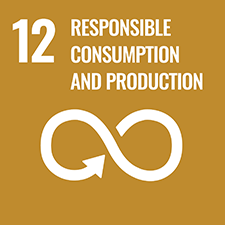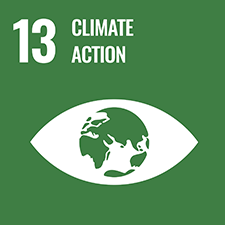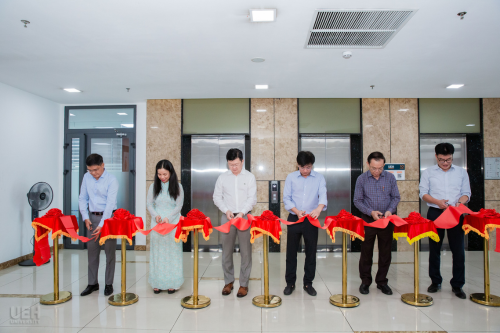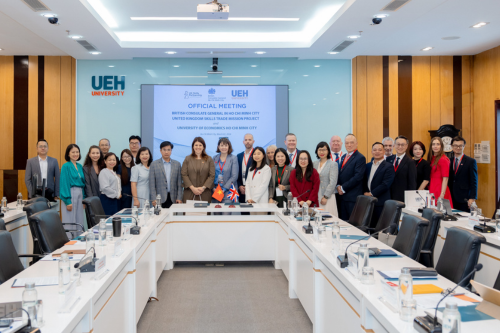![[Unboxing Glo-cal Program] Decoding Vietnam’s First Corporate Sustainability and Environmental Management Training Program](/images/upload/img_background/ueh-background-638786615207099418.png)
[Unboxing Glo-cal Program] Decoding Vietnam’s First Corporate Sustainability and Environmental Management Training Program
09 Mar, 2025
#Glo-calEducation #Corporate_Sustainability_and_Environmental_Management #UEH_Sustainable_Finance_Institute #UEH_ESG
|
# The first Corporate Sustainability and Environmental Management (ESG) program in Vietnam # A profession that is ranked in the top three in terms of income in Vietnam # 78% of companies currently have a demand for recruiting dedicated personnel for sustainable development; yet, they cannot fully meet this demand # The program equips learners with interdisciplinary thinking, integrating knowledge of management, finance, and environmental engineering to create sustainable solutions for businesses and society # The curriculum references the top 200 universities worldwide with output standards for "knowledge," "skills," and "autonomy, responsibility" |
In the context of the modern economy, sustainable management is not just an option; it has become a mandatory factor for businesses. In light of the increasingly stringent demands regarding Environment (E), Society (S), and Governance (G) – ESG, sustainable business practices not only ensure compliance with the regulations of both local and partner countries but also enhance a company's competitiveness, attract investors, expand international markets, and ultimately result in increased revenue and profits in the long term.
This shift has generated a significant demand for personnel in the field of sustainable management, making this profession one of the highest-paying sectors in Vietnam. According to salary forecast reports, the sustainable development sector currently ranks among the top three fields with the highest income. Fresh graduates can expect a starting salary ranging from 15 to 20 million VND per month while those with 5 to 10 years of experience can earn between 3,000 to 5,000 USD per month.
In response to the urgent market demand, the University of Economics Ho Chi Minh City (UEH) has become the first higher education institution in Vietnam to offer a program in Corporate Sustainability and Environmental Management, opening up learning and professional development opportunities for the next generation of talent in the green economy. Therefore, what makes this field of study so special in addition to why this a choice worth considering in this new era. Let us explore these questions in Article #2 of the “Glo-cal Education” branding program, featuring Assoc. Prof. Dr. Bùi Thị Mai Hoài – Dean of the Institute for Sustainable Finance at the University of Economics Ho Chi Minh City, the institution offering the Corporate Sustainability and Environmental Management program.
.png)
* Dear Assoc. Prof. Dr. Bùi Thị Mai Hoài, what is the reason UEH has chosen to open the field of Corporate Sustainability and Environmental Management as the first program in Vietnam?
Assoc. Prof. Dr. Bùi Thị Mai Hoài:
Firstly, sustainable development has become a requirement in most countries, including Vietnam. This leads to a significant demand for human resources in this field. According to the World Economic Forum, the report on the job market indicates that the demand for personnel in sustainable development is expected to grow by 33-34% each year. In Vietnam, 78% of businesses currently have a demand for personnel specializing in sustainable development; nevertheless, this demand has yet to be fully met. For detailed information on the RECRUITMENT NEEDS from business leaders, please refer here.
Secondly, this field of study aligns with UEH's strategy for diversified and sustainable development – a crucial orientation aimed at training high-quality human resources to meet the trends of integration and the green transition of the economy.
Thirdly, sustainable management meets global training trends. Over the past five years, universities ranked in the TOP 200 worldwide have begun to offer programs in this field. However, in Vietnam, UEH is a pioneer in providing interdisciplinary training in Corporate Sustainability and Environmental Management. Specifically, since 2022, UEH has implemented the Master's program in this field; up to date, there have been five successful cohorts of the master's program in Corporate Sustainability and Environmental Management. Additionally, UEH has recently introduced a "Sustainable Development" course for all undergraduate programs. With the existing experience, UEH is fully confident in the quality of our Bachelor’s training program in this field.
* What is the difference between Corporate Sustainability and Environmental Management and Business Administration?
Assoc. Prof. Dr. Bùi Thị Mai Hoài:
In reality, this program is very different. As you can recognize, sustainable development has become a mandatory requirement in most countries around the world, including Vietnam. To solve the issue of sustainable development, the collaboration of various specialties from multiple sectors is necessary. Currently, many universities do provide training in Business Administration, Finance, and Environmental Engineering. However, there has not been a program that connects this knowledge together to truly address the sustainable development challenge. This is precisely the role and the mission of the Bachelor's program in Corporate Sustainability and Environmental Management at UEH – a pioneering program that equips learners with interdisciplinary thinking, integrating knowledge of management, finance, and environmental engineering to create sustainable solutions for businesses and society.
* Dear Assoc. Prof. Dr. Bùi Thị Mai Hoài, what specialized knowledge does the Corporate Sustainability and Environmental Management training program offer?
Assoc. Prof. Dr. Bùi Thị Mai Hoài:
The specialized knowledge in the program is divided into three groups, allowing learners to choose according to their desired career path:
- If students wish to oversee tasks related to business management, they will choose the Sustainable Management module.
- If they have a passion for finance, they can select the Sustainable Financial Management module.
- If they aspire to serve in the public sector, they will opt for the Sustainable Public Management module.
With such specialized branch options, we are confident that Graduates of the Bachelor's Program in Sustainable Business Management and Environment will have a wide range of career opportunities. They can work in all manufacturing and business enterprises, in the financial sector listed as banks, insurance companies, or investment funds, in the sustainable development consulting departments of the Big Four, and they can also work in the public sector, contributing to the sustainable development of the economy.
.png)
* How has UEH built their team of personnel and faculty members to train for this field?
Assoc. Prof. Dr. Bùi Thị Mai Hoài:
In fact, UEH has long had a significant advantage with our Faculty and research team. UEH originally had strengths in the fields of Management and Finance, with a leading team of industry experts. In recent years, following a strategy of multi-disciplinary and sustainable development, UEH has attracted many talents from other fields, creating a strong human resource ecosystem capable of successfully operating both graduate and undergraduate programs in Corporate Sustainability and Environmental Management. Notably, the core faculty members of the program are specialists with interdisciplinary knowledge, participating in many international projects focused on sustainable development and possessing numerous research works on sustainability, management, and sustainable finance published in prestigious international journals. This is the crucial foundation that helps the program achieve high quality and meet global trends.
* The training program designed by UEH is constructed to meet the learning and development needs of students.
Assoc. Prof. Dr. Bùi Thị Mai Hoài:
According to Associate Professor Dr. Bùi Thị Mai Hoài, the program is built on the training philosophy of "Glo-cal," which means the effort to integrate global knowledge with local practices.
The Institute of Sustainable Finance has approached the regulations of the Ministry of Education and Training and referenced Top 200 Universities worldwide. Additionally, the program has conducted surveys of stakeholders, including employers and companies seeking personnel for sustainable development, and researched actual recruitment requirements. Based on this data, the program development team drafted the first output standards. This draft was sent to graduate students, businesses, sustainable development departments besides both domestic and international lecturers for feedback. After adjusting based on this input, the official output standards were finalized, which include: (1) Knowledge output standards; (2) Skill output standards; (3) Autonomy and responsibility output standards.
Based on these output standards, the program development team proceeded to design the training structure, determining necessary subjects to ensure students achieve the set goals, and obtained broad feedback before officially implementing it.
The structure of the training program officially consists of 125 credits, with 50 credits dedicated to general knowledge, aligned with the standards of all undergraduate programs at UEH. This ensures the following targets: (i) students have a solid foundation of general knowledge to independently train throughout their careers; (ii) convenience for students wishing to pursue double majors or degrees. Following that are 35 credits focused on interdisciplinary foundations in management, finance, and environmental engineering. Finally, there is specialized knowledge with three branches to choose from, as previously mentioned.
.png)
* In 2025, UEH will recruit for the major in Corporate Sustainability and Environmental Management with a target of how many admissions and which subject combinations for admission assessment?
It is expected that this year, the program will recruit 40 - 50 admissions. We are very confident in the competitiveness of the program as even graduate students working in human resources often ask: “Has UEH opened a Bachelor's degree in this field yet so that our company can start recruiting?” Moreover, many business leaders – also UEH graduate students – have expressed their interest: “Does the school train undergraduates so that I can advise my child on what to study?” This indicates that the program not only attracts students' interest but also meets the actual recruitment needs from businesses.
The undergraduate program in Corporate Sustainability and Environmental Management will consider admissions through 05 methods, including:
Method 3 (admission screening for candidates with good academic results) with the combinations: A00, A01, D26, D27, D28, D29, D30, AH3, D01, D02, D03, D04, D05, D06, DD2, D07, D21, D22, D23, D24, D25, AH2, D09, AH5, D36, D37, D38, D39, D40,
Method 5 (admission based on high school graduation exam results) with the combinations A00, A01, D01, D07, D09.
For more information regarding UEH admissions, visit here: https://tuyensinhdaihoc.ueh.edu.vn/
View the interview with Assoc. Prof. Dr. Bùi Thị Mai Hoài – Dean of the Institute of Sustainable Finance, University of Economics Ho Chi Minh City - here
——————————–
This article is part of the branding campaign for "Glo-cal Education," with the message "Empower Global Citizens for Sustainable Development" executed by UEH.
Glo-cal Education is a distinctive educational orientation of UEH that places learners at the center, striving to teach and to disseminate global knowledge in connection with local contexts and market realities. This innovative training at UEH is realized through: (1) Teaching and continuously updating knowledge from the Top 200 leading Universities; (2) Diversifying training methods that facilitate easier access to knowledge: from traditional classrooms, expert sessions, simulated reality rooms, to project-based courses and online classes; (3) Increasing the international integration of training programs at UEH.
Graduates from UEH are expected to become the future generation of global citizens with the following qualities: (1) the ability to self-direct their learning, (2) the capacity to work across borders and experience multicultural collaborative environments, (3) the potential to develop lifelong learning pathways in advanced countries, and (4) the readiness to explore both real and virtual environments with an understanding of technology.
UEH respectfully invites readers to look forward to the upcoming series of articles!
News, photos: Institute of Sustainable Finance, Department of Communications and Partnerships UEH





![[Research Contribution] Modernizing and Elevating Vietnamese Higher Education: Creating Breakthroughs in High-Caliber Human Resource Development and Talent Cultivation, Leading Research and Innovation](/images/upload/thumbnail/ueh-thumbnail-639083193174001549.png)

![[Research Contribution] Sustainable Manufacturing: A Driving Force for the Green Economy and the Challenges Ahead](/images/upload/thumbnail/ueh-thumbnail-639082294182922007.png)





